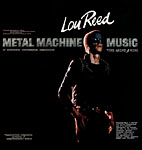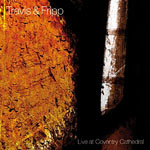Home » Jazz Articles » Interview » Ulrich Krieger: Bringing Metal Machine Music to Life
Ulrich Krieger: Bringing Metal Machine Music to Life
In the years that followed, the album gradually acquired cult status, as others listened to the album at length and digested its contents. In 1975, categories such as "noise" and "industrial music" did not exist. MMM spawned them and others, and has exerted a huge effect ever since.
 Ulrich Kreiger
Ulrich Kreiger
One key player in the increasing influence and rehabilitation of MMM is German-born saxophonist Ulrich Krieger. In 2002 Krieger, then a member of the Berlin-based ensemble Zeitkratzer, transcribed the album for the ten-member grouping. Lou Reed said he thought the task was impossible, but when he heard the results he agreed to appear with Zeitkratzer in a live performance of MMM in Berlin. A CD and DVD of that performance appeared on the Asphodel label in 2007.
Since that concert, Krieger has left Zeitkratzer and moved to California. In 2008, Reed and Krieger formed Metal Machine Trio—MM3—along with electronics wizard Sarth Calhoun. The trio debuted at REDCAT in Los Angeles in October 2008 and played the New York Blender Theater in April 2009. The recording of the REDCAT concerts was released on a double CD, The Creation of the Universe (Sister Ray, 2008). The trio does not faithfully reproduce MMM, but plays a broad spectrum of improvised music inspired by it. Away from MM3, Krieger also plays with other groupings, notably Text of Light with Lee Ranaldo and Alan Licht, among others.
Metal Machine Trio is currently preparing to tour Europe and Lou Reed is releasing a remastered version of MMM on his Sister Ray label.
All About Jazz: What originally prompted you to start your transcription of Metal Machine Music? How long had you listened to or been aware of MMM?
Ulrich Krieger: When I bought the original album around 1979/80 and listened to it the first time, I thought that it sounded orchestral. I heard a common link between Metal Machine Music and orchestral music by Xenakis and other contemporary classical composers. I also heard it as being connected to free jazz (John Coltrane, Albert Ayler, Ornette Coleman) and industrial music (Throbbing Gristle). This is all music I had been listening to before hearing MMM. So it kind of combined some of my favorite musics in one piece.
The idea of doing an arrangement comes from back then, but it was just an idea. Not until I played with Zeitkratzer in Berlin and we did our first collaboration with noise artists (Merzbow, Karkowski) I realized that this ensemble might be able to play MMM. I listened to it over several weeks doing a rough transcription. Luca Venitucci, accordion player from Rome and Zeitkratzer's accordion player at the time, had also done a rough transcription and we sat down together in Berlin comparing our results. For the most part we had heard the same things, which was very assuring. After that the actual arrangement was done in one week of intense work.
AAJ: Prior to starting the transcription, had you played MMM on saxophone?
UK: No, I didn't play it on saxophone before, and I don't think it would be possible. MMM is a piece which needs an ensemble, especially strings; the larger the ensemble, the better. We did a performance with the Great Learning Orchestra in Stockholm with over thirty players, including sixteen strings. That was great. The last performance was with Fireworks Ensemble in New York and we had ten strings which worked great and was one of the best MMM performances ever, but I wouldn't go below eight to ten string players these days.
You could do something along the lines of MMM with saxophone and electronics, but it never would be MMM, you never could get all the details, melodies, form, etc... I do a lot of noise music on the saxophone, but it is not MMM.
AAJ: When doing your transcription, what problems, if any, did you encounter on the way?
UK: The problem with MMM is that it is so dense. The original transcription/arrangement from 2002 tried to grasp the essential elements and the most important details. Since then I have done three major revisions, adding more material by listening back to the original again and again and adding more details, more precise timings, changing some of the arrangement around to make it sound even closer to the original. And every time a further performance is scheduled I give it another listen and try to add more details and be more precise. Due to its density you always hear new elements, new details.
AAJ: Since Zeitkratzer performed MMM with Lou in 2002, you have left Zeikratzer, relocated to the US and taken up an academic post. Was your departure amicable? Do you envisage playing with Zeitkratzer again in the future?
 UK: Actually, honestly, no. Zeitkratzer was in a big crisis at the end of 2002 and, when I left in early 2003, not only me but most of the original members left with me or had already left. After 2002 Zeitkratzer was mostly a new line up, a new group. There were many artistic and personal differences that were unsolvable. I don't think I will play with Zeitkratzer again.
UK: Actually, honestly, no. Zeitkratzer was in a big crisis at the end of 2002 and, when I left in early 2003, not only me but most of the original members left with me or had already left. After 2002 Zeitkratzer was mostly a new line up, a new group. There were many artistic and personal differences that were unsolvable. I don't think I will play with Zeitkratzer again.
I started teaching at the California Institute of the Arts in 2007. Coming to California had nothing to do with Zeitkratzer. The artistic atmosphere in Europe felt too limited, too closed, too one-dimensional, too ideological—I don't really know what to call it. The academic post gives me the freedom just to do projects/concert I really like to do. I don't have to hassle with public grants anymore, which I felt to be very limiting and kind of oppressive. You always administrate the deficiencies, you are always underpaid for the work you do, and you are supposed to be grateful for that. Grants, especially public grants, are like pocket money parents give a child. It is never enough and if you don't play by the rules, you don't get it. You have to fit into the description of art at any given time that the grant-giving institutions or juries have defined. You only get money for art officially sanctioned—this is the death of art and we see this crisis all over Europe now.
Over the years I have become a big critic of public grants the way they are given in Europe—although I profited from them especially in my early career. But that is a long discussion for another time... Here in California, I compose a lot and my music gets performed regularly, I improvise, play experimental rock music, noise, silent music, and leftfield metal. This is not a profile appreciated much in Europe, which likes to pigeonhole its artists.
AAJ: Whose idea was it to create Metal Machine Trio as an ensemble to perform live? Did you suggest it to Lou, or vice versa?
 Lou Reed
Lou Reed
UK: It kind of developed naturally. I used to be in New York regularly and after Zeitkratzer performed MMM I met Lou whenever I was in town. Out of our conversation the idea of playing together evolved. Redcat (the experimental theater at the Disney concert hall complex in downtown LA) was then a possibility to try it out. Lou proposed to add Sarth Calhoun to it, with whom he had worked already in New York. Sarth does real time processing as well as playing the continuum fingerboard using a kyma system and other electronics.
AAJ: MM3 plays music in the spirit of MMM, rather than creating a faithful reproduction of it. What rehearsal, discussion or pre-planning goes on between the three of you prior to a live performance by MM3?
UK: We normally rehearse/improvise and then talk about what we played, what worked, what didn't work. We also try out ideas one of us might have and we just play. The music of MM3 is in the spirit of MMM but includes a much wider field from ambient to noise to experimental rock to electronica. The concerts are all freely improvised based on our experiences from the rehearsals and previous shows.
AAJ: What should a fan of MMM expect to hear or experience when they come to see MM3 live? Is the double CD, The Creation of the Universe, a typical MM3 performance?
UK: The double CD is a good example of a typical MM3 show, but The Creation of the Universe was from our first concerts in LA. I think we have developed a lot since. We know each other much better now, musically and personally. And because we improvise freely, concerts may vary a lot. Some shows might be more ambient and calm, others might be more noisy, sonic assaults and others again might be more "free rock." But any of these elements might be found in most MM3 shows. Our sound is mostly dense and multi-layered.
AAJ: How does MM3 fit in with your other playing activities such as Text of Light....?
 MM3, from left: Sarth Calhoun, Lou Reed, Ulrich Krieger
MM3, from left: Sarth Calhoun, Lou Reed, Ulrich Krieger
UK: MM3 is another aspect of my musical interests. Surely much of what I do with Text of Light has found its way into MM3. But playing with other musicians makes me play different, makes me take in new influences and directions. Otherwise there would be no point in playing in different groups or with different musicians. In MM3 I include traces and influences from R&B and rock saxophone, which I normally don't use in Text of Light, for example. This is surely an influence coming from Lou, a space which had opened up, and a part of my musical interest I had not really ventured into much until we started to play with MM3. Of course, all my interests in ambient, noise, drones, post-free jazz, post-rock, metal, contemporary art music, extended saxophone playing techniques, amplified saxophone, etc are audible in MM3. It feels like in MM3 everything is possible at any given time.
Selected Discography
Lou Reed's Metal Machine Trio, The Creation of the Universe (Sister Ray, 2008)
Zeitkratzer, Metal Machine Music (Asphodel, 2007)
Text of Light, Un Pranzo Favoloso A Fabulous Lunch (FinalMuzik, 2007)
Lou Reed, Metal Machine Music (RCA, 1975)
[Lou Reed's 1975 album, Metal Machine Music, has been digitally remastered by Reed and will be released on double vinyl, audio DVD and Blu-ray on April 19, 2010. For further info about the UK tour dates, please visit Lou Reed's website].
Photo Credits
Amy-Beth McNeely
Tags
PREVIOUS / NEXT
Support All About Jazz
 All About Jazz has been a pillar of jazz since 1995, championing it as an art form and, more importantly, supporting the musicians who make it. Our enduring commitment has made "AAJ" one of the most culturally important websites of its kind, read by hundreds of thousands of fans, musicians and industry figures every month.
All About Jazz has been a pillar of jazz since 1995, championing it as an art form and, more importantly, supporting the musicians who make it. Our enduring commitment has made "AAJ" one of the most culturally important websites of its kind, read by hundreds of thousands of fans, musicians and industry figures every month.






















